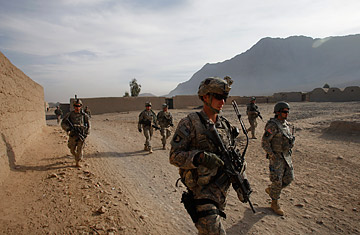
U.S. soldiers from First Battalion, 502nd Infantry Regiment, 101st Airborne Division, patrol in West Now Ruzi village, in Panjwai district, Afghanistan
Ambassador Richard Holbrooke will be remembered more for his epic achievement in brokering an end to the war in Bosnia, than for the frustration of his final mission in the conflict theater designated "Afghanistan-Pakistan" in Washington. As the Administration completes its scheduled review of Afghanistan strategy this week, officials are struggling to put an optimistic face on a grim reality: nine years after invading Afghanistan — and despite the best efforts of Holbrooke and countless American diplomats, aid officials and soldiers — the U.S. is spinning its wheels in a country that styles itself as "the graveyard of empires." The Taliban insurgency is growing; the Karzai government is so riddled with corruption that it alienates the civilian population in the war zone; and Pakistan simply refuses to close down the sanctuaries on its soil from which the Afghan insurgency is waged.
None of this was any personal failing on Ambassador Holbrooke's part. The hard-charging diplomatic style that allowed him to bully Balkan warlords into an imperfect and yet indispensable Dayton peace accord was of little use in the Afghanistan-Pakistan conundrum. The difference, fundamentally, is a question of American power in the Balkans in 1995, compared with American power in the Hindu Kush in 2010. In 1995, the bombs were already falling as Holbrooke held Slobodan Milosevic's feet to the fire, warning him that he was on a path to obliteration, while at the same time offering him an off-ramp he eventually accepted for fear of the getting on the wrong side of the lone superpower finally flexing its muscles in the Balkans. But when it came to sweating Pakistan into doing more to close down the Afghan Taliban or badgering President Hamid Karzai to crack down on corruption in his government, Holbrooke made little headway. Whether he bellowed at them or spoke softly and sympathetically, Karzai and the Pakistanis made their decisions based on their own interests, which are not always the same as America's. And both parties know that the U.S. has precious little alternative but to work with them. Washington has played the military card in the Afghan theater, and it has failed to prevail. The upbeat assessments of General David Petraeus notwithstanding, neither Karzai nor the Pakistanis believe the U.S. can win the war in Afghanistan. Nor is it in a position to take action against them or replace them with more pliable alternatives.
Sure, Holbrooke's abrasive style antagonized Karzai and ruffled feathers in Islamabad. The Washington Post's David Ignatius writes that President Obama had planned to remove Holbrooke as envoy, but was persuaded by Secretary of State Hillary Clinton to leave him in place. But the problems the U.S. is facing in Afghanistan and Pakistan are not those of personality or personnel, and the differences between Washington and its putative allies in the Af-Pak theater are not about politesse and diplomatic ritual. Karzai and the Pakistanis make cold balance-of-power calculations based on their own interests, which are not always the same as Washington's no matter how many American envoys try to persuade them otherwise. They don't believe America will win the longest war in its history, and that guides their own power plays and reluctance to implement U.S. strategy.
Holbrooke, the quintessential realist, had in fact become one of the Administration officials most willing to publicly discuss the limits of what could be achieved by force in Afghanistan. While he vigorously opposed any precipitous retreat or capitulation, by last summer he had begun publicly advocating for some form of political settlement with the Taliban, based on U.S. "red lines," like forbidding sanctuary to al-Qaeda.
"Let me be clear on one thing, everybody understands that this war will not end in a clear-cut military victory. It's not going to end on the deck of a battleship like World War II, or Dayton, Ohio, like the Bosnian war," Holbrooke told reporters last July. "It's going to have some different ending from that, some form of political settlements are necessary; you can't have a settlement with al-Qaeda, you can't talk to them, you can't negotiate with them, it's out of the question. But it is possible to talk to Taliban leaders."
The Administration has, of course, been haltingly moving in that direction, with plenty of caveats and while remaining committed to a military escalation aimed at pummeling the Taliban to accept a negotiated outcome more favorable to U.S. goals. A negotiated solution with the Taliban is hardly a controversial proposition in Kabul or Islamabad, and recent opinion polls found that three-quarters of Afghanistan's citizenry seek the same — and 55% want foreign troops to leave the country as soon as possible. Still, even getting to a glass-half-full outcome of the sort Holbrooke orchestrated at Dayton may yet take years, and is far from certain. Getting there would have been helped by Holbrooke's legendary diplomatic acumen — although it may be that more of the cajoling of the unconvinced for which he was so famous will have to be done not in Kabul or Islamabad, but in Washington.
